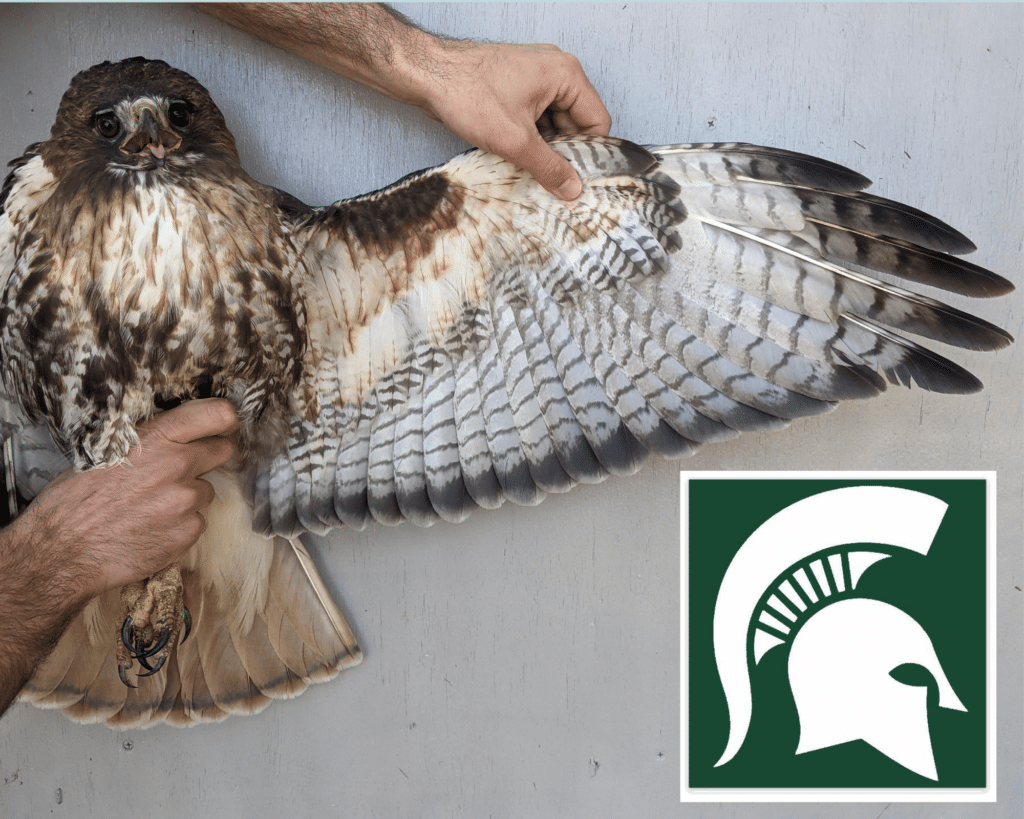
Season Summary:
Spring migration banding for diurnal raptors began on March 29th and ended on May 30th. A total of 52 days of trapping resulted in the total capture of 228 birds of 8 species. The two most commonly captured species were Red-tailed hawk (RTHA, Buteo jamaicensis) with 150 newly banded birds and two foreign recaptures and Sharp-shinned hawk (SSHA, Accipiter striatus), with 57 new individuals banded and two foreign recaptures.
| Species | Total Number Captured 2021 | Total Number Captured 2020 |
| Merlin: (Falco columbarius) MERL | 4 | 6 |
| American Kestrel (Falco spaverius) AMKE | 0 | 4 |
| Cooper’s Hawk: (Accipiter cooperii) COHA | 3 | 4 |
| Northern Goshwak (Accipiter gentilis) NOGO | 0 | 3 |
| Sharp-shinned Hawk: (Accipiter striatus) SSHA | 59 | 66 |
| Red-shouldered Hawk: (Buteo lineatus) RSHA | 1 | 2 |
| Rough-legged Hawk: (Buteo lagopus) RLHA | 2 | 1 |
| Red-tailed Hawk: (Buteo jamaicensis) RTHA | 152 | 88 |
| Broad-winged Hawk: (Buteo platypterus) BWHA | 1 | 2 |
| Northern Harrier: (Circus cyaneus) NOHA | 6 | 8 |
| Golden Eagle (Aquila chrysateos) GOEA | 0 | 1 |
| Season Total: | 228 | 185 |
Red-tailed Hawk Movement Ecology Project:
This season MSRW’s raptor banding expanded into a new project to study RTHAs. This spring 11 GPS/GSM data transmitters were outfitted onto eleven adult RTHA’s between April 1st and April 17th. The goal of this project is to document the full cycle migration of RTHA’s through the straits and great lakes region, and to help us better understand how the great lakes influence RTHA’s migration. Nick Alioto will be using this data to write his thesis over the next few years at Michigan State. To date, eleven birds have already collected over 20,000 GPS points along with corresponding behavioral data. Of the eleven RTHA’s, seven are currently in Northern Ontario. The remaining four RTHA’s have not sent a transmission since their last location. The last location for those four birds was in the eastern Upper Peninsula of Michigan (Map 1). I will provide updates along the way on the continued journeys of our RTHAs. We also plan to deploy more units during the next spring banding season in 2022 so stay tuned!

